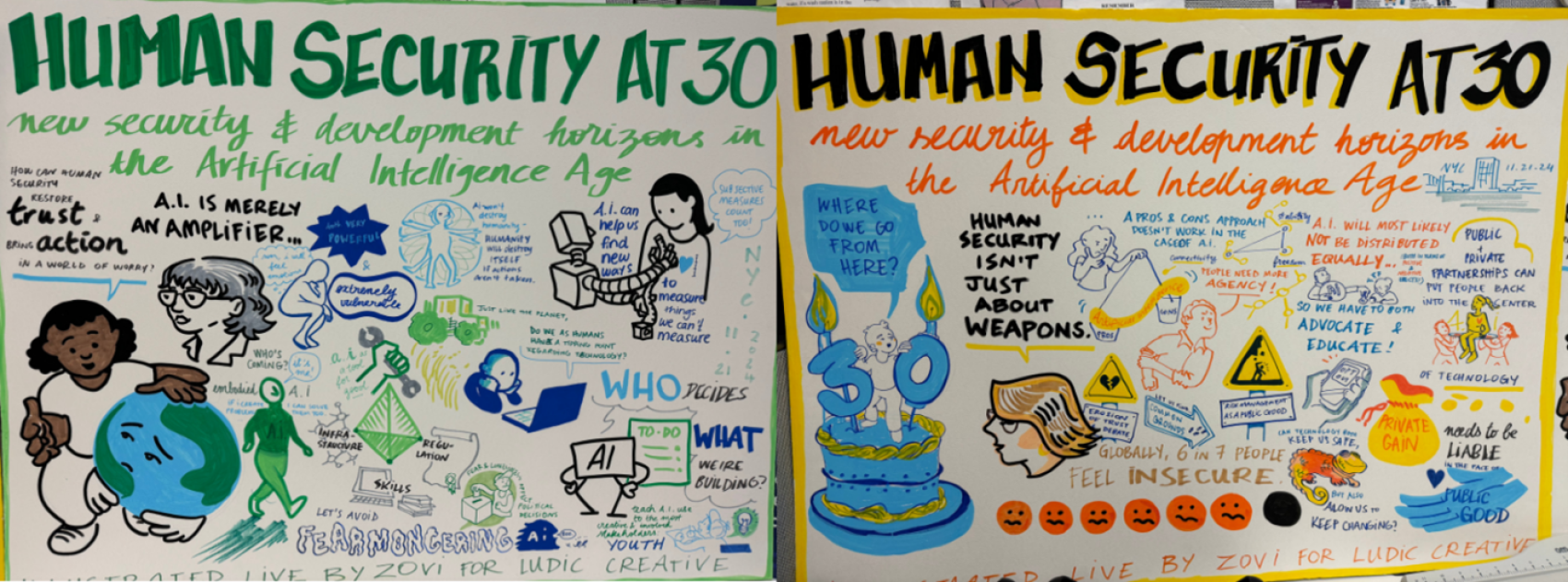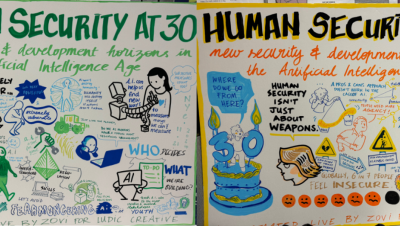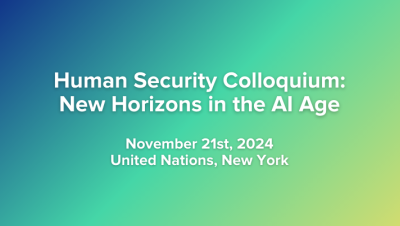The Human Development Report Office (HDRO) hosted a colloquium entitled, “Human Security at 30: New Horizons in the AI Age” at the United Nations Headquarters. Attended by more than 300 policymakers, researchers, civic leaders, and development practitioners—both in person and virtually—the event explored how perceptions of human security have evolved since the concept was first introduced in the 1994 Human Development Report and how those perceptions are shaped by artificial intelligence.
The daylong colloquium was divided into two parts. The public-facing morning session, geared towards the policymaking community, featured panel discussions on the emerging opportunities and challenges that AI poses for human security, as well as on human security’s potential to restore trust in an era in which the effects of AI are exacerbating distress and distrust over people’s life prospects. A closed-door technical roundtable in the afternoon focused on metrics for a new age.
The principle of human security shifts attention from the security of borders, land and territories to the security and wellbeing of individuals. It focuses on vulnerabilities that do not stem from hostile actions.
H.E. Ambassador Yamazaki Kazuyuki, Permanent Representative of Japan to the United Nations, opened the colloquium by noting the timeliness of the theme amidst a fraught global landscape.
“Humanity faces a variety of compounding and intertwined challenges such as poverty, climate change and pandemics, and … more frequent and prolonged conflicts,” he observed. “Artificial intelligence and other cutting-edge digital technologies have shown the potential to significantly improve people's survival and living conditions.”
“We hope that today's seminar will contribute to strengthening positive dynamics between human security and AI for human development,” he added.
Other high-level speakers for the colloquium included Laura Chinchilla, former President of Costa Rica; Luis Felipe López-Calva, World Bank Director for Poverty and Equity; and Ilana Ron Levy, Managing Director of Gallup.
“Human security should be a top priority for local, national, and international policymaking,” asserted Chinchilla, who also sits on the 2025 Human Development Report Advisory Board as its Co-Chair.
HDRO Director Pedro Conceição said that human security holds that “people should have the right to live lives free from want, free from fear; lives of dignity.”
In his remarks, Conceição described human security as a useful lens “to see that many disputes are not zero-sum; to have a comprehensive perspective on interconnectedness; [and] to see people as active agents in shaping what’s to come.”
Some of the themes discussed during the colloquium included the potential existential risks posed by AI. Toby Ord, a philosopher from Oxford University, expressed concerns about how current inequalities matter for such risks:
"The countries that develop a powerful new technology will likely capture an unequal share of its benefits. But when that technology poses an existential risk, this terrible downside is imposed equally on all people of the world."
In contrast, Rita Singh, a scientist at Carnegie Mellon University, challenged the notion that AI itself could destroy humanity. She argued:
"Humanity is going to destroy humanity if we don’t take action. AI is not a tool to fear."
Despite their differing perspectives, the experts underscored the human security approach as a tool for effectively managing these risks.
Discussions during the colloquium will inform the research and writing of the 2025 Human Development Report, which will explore the key crossover issues between human development, digital transformation, and artificial intelligence.
Watch the event recording: https://bit.ly/3V9L8Sc
Download the 2022 Special Report on Human Security: https://hs.hdr.undp.org/
Event photos: https://flic.kr/s/aHBqjBTdQY


